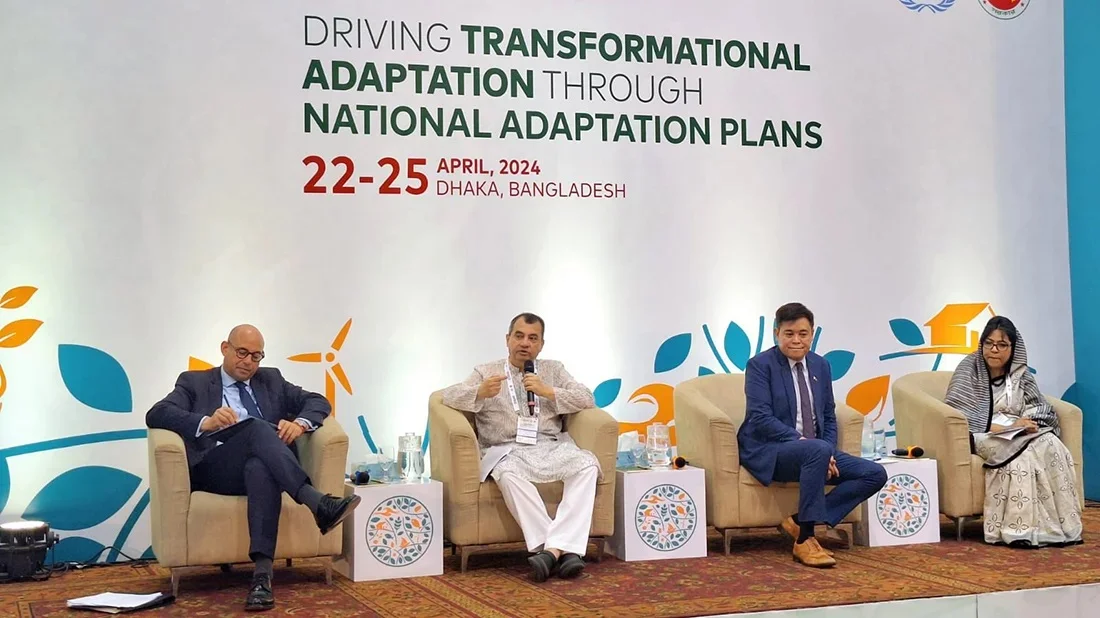Saber: Bangladesh pledges to create resilient world for all
Share on:

Highlighted progress made despite numerous impacts of climate change
Minister of Environment, Forest and Climate Change Saber Hossain Chowdhury said that Bangladesh, under the leadership of Prime Minister Sheikh Hasina, pledges to be a partner in creating a resilient world for everyone, including the youth and child to be born tomorrow.
The minister said this during the “Session II: High-Level Transformational Dialogue – A transformed NAP for the Future” at NAP EXPO 2024 hosted by the Ministry of Environment, Forest and Climate Change, with the theme “Driving Transformational Adaptation Through National Adaptation Plans (NAPs)” on Monday.
"At the global level, she has been a powerful and respected voice for the most climate-vulnerable countries, advocating for enhanced adaptation funding, critical importance of limiting temperature increases to 1.5 degrees Celsius, establishment of the Loss and Damage fund, and transfer of technology," he added.
The minister highlighted the significant progress made despite the numerous impacts of climate change on Bangladesh and its people — such as the growing number of displaced climate refugees, heightened natural hazards, flooding, food security issues, salinity intrusion, droughts, rising sea levels in the south, increased glacial melt in the Hindu Kush Himalayas to the north, water stress, and biodiversity loss.
Despite these challenges, Bangladesh, under the leadership of Prime Minister Sheikh Hasina, views itself not merely as a victim of climate change, but also as a leader and innovator in developing solutions, he added.
The minister said: "In the current fiscal year, Bangladesh has allocated nearly $3.5 billion across 25 line ministries to address the impacts of climate change. Additionally, a National Adaptation Plan spanning from now until 2050 has been devised, requiring an investment of $230 billion. Integration of health interventions, and recognizing their growing connection with climate change, is an ongoing effort. This comprehensive plan includes 113 interventions across 8 thematic sectors within 11 vulnerable areas. Notably, the Bangladesh Climate Change Trust Fund (BCCTF), established in 2009 using the country’s resources, stands as the world's first of its kind."
Saber Chowdhury highlighted that Bangladesh's Parliament was the first to address a Planetary Emergency.
“We've integrated green and climate-resilient development into our central planning, notably with the Mujib Climate Prosperity Plan, guiding our journey from vulnerability to resilience to prosperity. The Bangladesh Climate Development Partnership (BCDP), a pioneering initiative, unites all stakeholders, including youth and women, for effective climate action and boosts funding for Bangladesh-led projects,” he added.
He expressed disappointment over the global community's failure to fulfil the $100-billion pledge for climate adaptation.
He stressed the need for COP29 to establish a clear definition of climate finance and prioritizing the needs of vulnerable countries, small island states, and least developed countries (LDCs).
The minister emphasized that combating climate change requires immediate action. To limit warming to 1.5 degrees Celsius, emissions must peak next year and halve by 2030. Renewable energy must triple, and energy efficiency must double by then. He underscored that mitigation is essential for adaptation.
Saber warned that time is running out, urging global trust and solidarity. He emphasized the importance of the United Nations Framework Convention on Climate Change (UNFCCC) fulfilling its commitments, with national adaptation plans remaining crucial.
Other speakers at the session included Simon Stiell from the UNFCCC, Robert EA Borje, and Dr Farhina Ahmed from the Ministry of Environment, Forest, and Climate Change, along with the Director of the Philippines Climate Change Commission.

